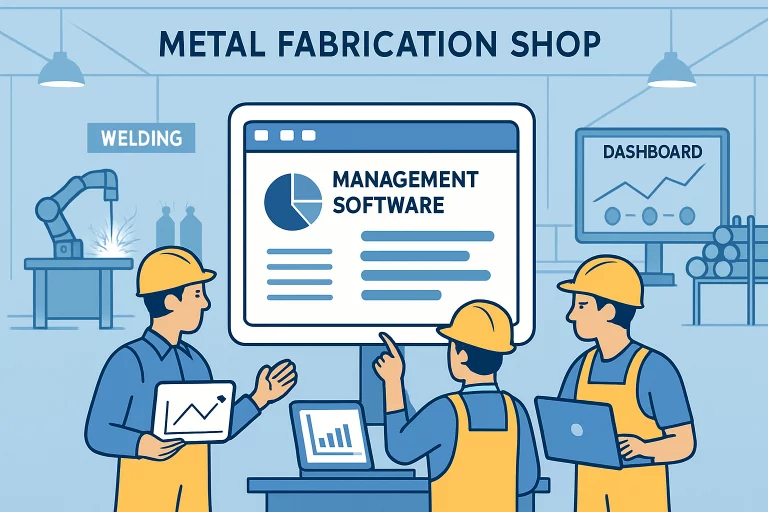Table of Contents
Introduction
In today’s fiercely competitive metal fabrication industry, standing out is not just about craftsmanship and reliability—it’s about harnessing technology that elevates your business to the next level. As client and stakeholder expectations evolve, fabrication shops are compelled to find smarter ways to operate. The integration of advanced digital tools is no longer a future goal but a present-day necessity. Embracing a unified software solution to manage workflows, job scheduling, inventory, analytics, and reporting is essential for staying ahead.
More fabrication businesses are implementing fabrication shop management software to bring coherence and agility to their daily operations. These platforms do more than just digitize paperwork—they create centralized command centers where managers and staff can track every process, react swiftly to changes, and keep teams aligned. By leveraging real-time data, automating routine tasks, and standardizing workflows, shops can respond dynamically to shifting customer needs, accelerate turnaround times, and sharpen their competitive edge.
Enhancing Production Efficiency
In fast-paced fabrication settings, efficiency is crucial to success. Management software enhances productivity by automating tasks such as scheduling, task assignment, and project tracking, thereby eliminating manual errors and freeing staff for higher-value work.
Automation and Integration: Automation optimizes resource allocation and reduces delays by ensuring seamless scheduling and integration with inventory and procurement systems. This facilitates smooth collaboration across teams and prevents common issues, such as material shortages or equipment conflicts.
Standardizing Workflows: Efficiency also depends on consistent processes. Standardized workflows minimize variability, ensure quality, and facilitate the training of new staff and the scaling of operations, resulting in predictable outcomes and higher customer satisfaction.

Improving Inventory Management
Inventory can be one of the most significant sources of pain or profit in the fabrication process. Balancing just enough stock to keep projects moving without over-investing in surplus is a never-ending challenge. According to Investopedia, effective inventory management involves tracking stock levels, orders, sales, and deliveries to avoid excess or insufficient inventory. Modern management software supports this by providing managers with real-time, centralized visibility into every aspect of their inventory. From raw materials and components to finished goods, you can see exactly what you have, what you need, and when you’ll need it. This transparency enables more accurate planning, reliable ordering, and streamlined stock rotation, ensuring materials are always available without tying up excess capital.
Just-In-Time Materials: With precise tracking and forecasting features, fabrication shops can confidently implement just-in-time inventory management practices. This approach minimizes holding and storage costs, reduces waste due to obsolescence or spoilage, and prevents costly project delays. Automatic reordering alerts and integrated purchasing tools further enable fast and effective communication with suppliers, ensuring materials are secured exactly when projects demand them. The result is less inventory sitting idle on shelves and a production process free from preventable shortages and bottlenecks.
Cost Savings and Reliability: Effective inventory management has a direct and positive impact on the bottom line. By maintaining tighter control over stock, shops can reduce costs associated with excess inventory, prevent losses from spoilage or theft, and unlock greater operational flexibility. When all materials and their usage are meticulously tracked, managers can quickly respond to unexpected changes, adjust stock allocations across projects seamlessly, and deliver rush orders without missing a beat. Enhanced reliability in inventory translates to improved customer trust and a stronger overall reputation in the marketplace.
Enhancing Quality Control
Quality Control Integration: Management software embeds quality control throughout the fabrication process with tools for monitoring, documentation, and reporting. Managers can track benchmarks, log inspections, and address issues in real time. This reduces rework, avoids delays, and boosts customer satisfaction by catching problems early.
Proactive Defect Detection: Quality checks are integrated into each production stage, enabling the immediate identification and resolution of defects. Continuous inspections minimize waste and rework, ensuring that products meet client specifications. This proactive approach enhances reputation, reduces costs, and supports customer retention.
Documentation and Compliance: Digital record-keeping captures every production step, allowing for rapid access during audits or customer inquiries. Management software streamlines compliance with industry standards through batch tracking and comprehensive process documentation. This transparency fosters trust with customers and regulatory bodies.
Facilitating Data-Driven Decision Making
Timely Decision-Making: Management software equips fabrication businesses with unified dashboards and real-time analytics for instant visibility into operations. It replaces outdated, anecdotal systems with accurate, current data on orders, resource use, costs, and customer trends. Owners and managers gain a comprehensive overview to support informed, fast decision-making. With customizable analytics, it becomes easier to monitor performance across departments. This level of transparency ensures that every decision is grounded in facts rather than guesswork.
Continuous Improvement Cycles: Data insights support ongoing improvement by revealing bottlenecks and inefficiencies. Teams can optimize machine and labor usage while forecasting resource needs with greater precision. By regularly reviewing analytics, businesses can make timely course corrections and implement strategic changes. Real-time data also drives more innovative inventory management and more responsive shop floor adjustments. These continuous improvement cycles foster a culture of innovation, leading to sustained gains in workflow efficiency and profitability.
Competitive Advantages: Advanced management systems provide fabrication businesses with superior agility, speed, and quality compared to manual processes. They allow companies to adapt quickly to market shifts and reduce operational waste. Faster project completion and consistent quality elevate client satisfaction and strengthen reputations. Data-driven operations also enable better efficiency and higher profit margins than traditional setups. As a result, businesses that embrace these systems are better positioned to lead their industry.
Conclusion
The modern fabrication industry demands more than just technical expertise and hard work—it requires digital transformation. Fabrication shop management software is now an indispensable tool for any business seeking to thrive in an evolving landscape. From automating repetitive tasks and standardizing best practices to enhancing inventory control and unlocking powerful analytical insights, these platforms create a launchpad for continuous improvement and scalable growth. The outcome is not just lower costs and smoother operations, but also a more agile, customer-focused business, primed for enduring success in an increasingly complex marketplace.


